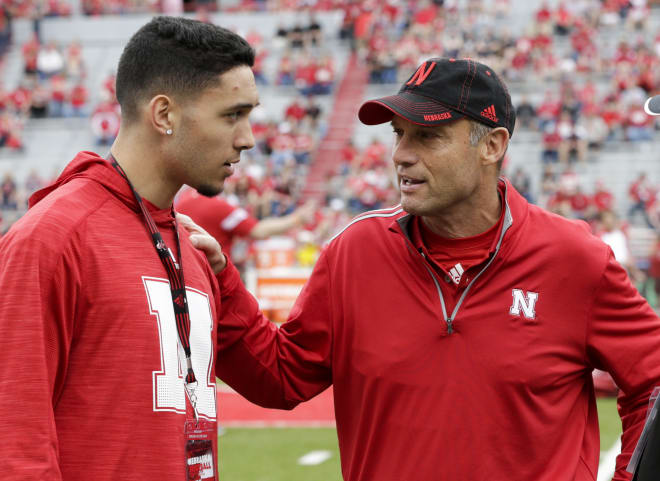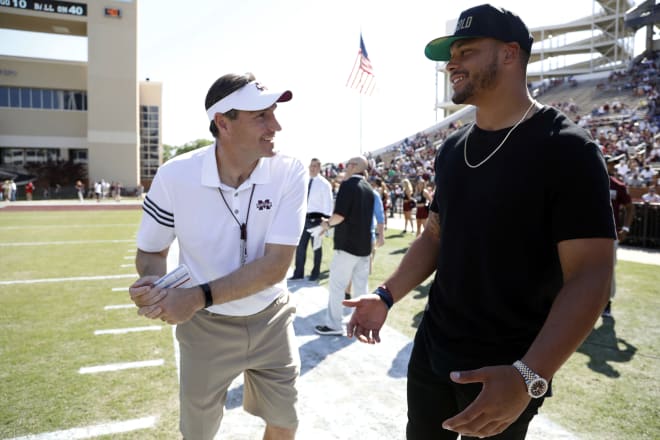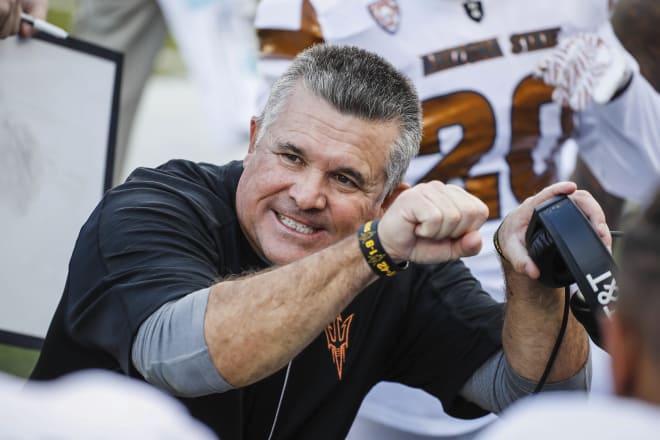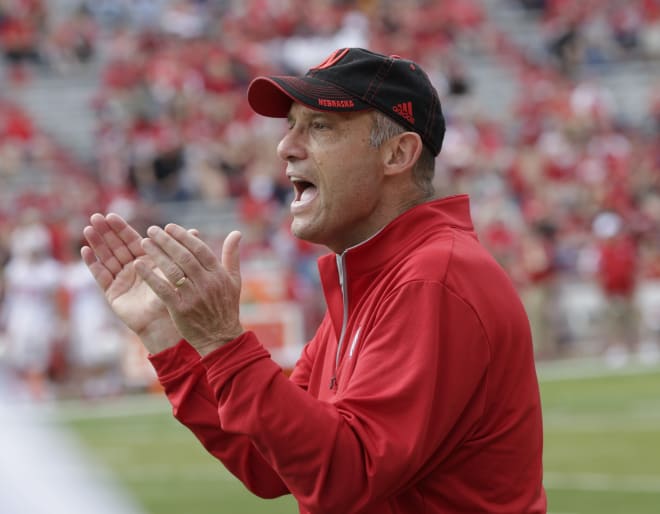Coaches strong proponents of new streamlined satellite camps

COLLEGE STATION, Tex. -- Satellite camps are not a new concept. In fact, spring of 2016 could have been unofficially dubbed as the season of the satellite camp.
How much is gained from such events - both by players and coaches - might vary depending on who is asked, but the camp held at Texas A&M’s football practice facility on Sunday afternoon could be considered the evolution of the satellite camp experience. After a brainstorming session on a coaches retreat this past offseason, a select group of adidas-partnered teams chose to work with each other to better streamline the satellite camp experience so that more coaches from more top programs could take more from them.
Mega-camps sound like a great opportunity for players to get noticed in theory, but often times they are staffed by predominately smaller programs represented by one or just a few assistants from each. The adidas-branded satellite camp series, taking place this week, has united entire coaching staffs from partnered schools – most of which come from Power Five conferences.
Usually, a head coach’s blessing is often required before an offer is passed along to a recruit. With the head coaches already at the camp – already coaching the players in attendance — the path to picking up some of those big-time offers is much more direct for recruits.
Texas A&M volunteered to host the first event that are taking place this week throughout Texas, Georgia and Florida. Among the head coaches that made the visit out to College Station, were Arizona State’s Todd Graham, Mississippi State’s Dan Mullen and Nebraska’s Mike Riley. All three had plenty to say about the value of a finer-tuned satellite camp, and how it plays into other recruiting strategies, particularly when it came to their efforts in Texas.

Rivals: What is the value of the 'new' satellite camps to your program?
Mullen: Everyone is talking about the level of exposure that kids need to be able to get, and the number of head coaches that are here, I don’t know that there is an event in Texas that’s going to give more exposure to more Power Five head coaches and staffs than this event here today.
Riley: There are a ton of kids here. A ton of coaches from all over the place. It kind of goes back to when we would do these big combines that we didn’t coach in, but were able to watch and evaluate. Now, we act as coaches right here, hired by A&M, and it’s also pretty cool that this is a conglomerate of adidas schools.
Rivals: How much do you emphasize establishing a recruiting footprint in Texas?
Riley: I love it in Texas. Since we got the Rodgers brothers (Jacquizz Rodgers, James Rodgers) years ago at Oregon State out of Lamar Consolidated, I’ve loved recruiting in Texas, that was back in 2006 or 2007, and it is really natural at Nebraska for us to be down here. High school football here is at the highest level, it’s relatively accessible for us for where we are, so this is perfect. It’s very important for us to be here, be present, and have an opportunity at a camp like this to see so many kids.
Graham: For one thing, I was born-and-raised here. I went to North Mesquite High School, and I was a Texas High School football coach. That helps having those relationships and it’s a pretty close-knit community and the talent-level here is tremendous. I think we’ve got something like 21 players on roster from Texas, so it’s something that the discipline, the character and the winning tradition that it takes to transition to the next level is all in this state. Our primary area is Arizona and southern California, and then our next area is Texas, so this is a big deal for us and we’ve had a lot of success here.

Rivals: How have recruiting revivals at Baylor and Texas affected the competition for players in Texas?
Graham: Recruiting doesn’t matter until it’s over. It matters who you end up with and getting the guys that are right for your program. My deal is I love things like this, because kids need the look - each one of them is unique and they need the opportunity. Finding the right place and the right fit is important, but the key is finding the right guys. It’s not about who has more momentum now, at the end of the day if you win and you’re graduating your players, and your guys are going on to be successful in the working world - or especially in the NFL - you reap what you sow and it’s a body of work every year. Turnover - that’s just the way it is, it’s a business. You look at Alabama, you can look at anywhere, whether you win or lose you’re going to have turnover.
Rivals: How can a spring game experience influence recruits?
Riley: The recruiting and evaluation process has accelerated so much over the last five-to-ten years. So more and more kids through the years have visited during the spring. For us, we have the bonus that our spring game is almost like a true gameday experience. There were 78,000 people in our stadium and it was a tremendous atmosphere on a great day. We had 30 guys on campus that we had offered already, and that was very big for us, very important and our fans are unbelievably important to our recruiting process.(Nebraska’s Memorial Stadium and A&M’s Kyle Field) are two great scenes for college football. It’s spectacular to get involved with our gameday experience at Lincoln. We have a very, very unique experience, and I’ve coached a long time. I really appreciate, but I would say that if you’re talking about our schools, you’re talking about great fan bases, great involvement, and a great picture for college football.

Rivals: What strategies have you and your assistants found particularly successful with recruits?
Riley: I’ve got a really good group of people and I think they all bring something new and different to the table. I think that if you take a guy like Donte Williams, who is new to our staff, he’s one of those guys that’s really good at building relationships with people. I think just who he is just resonates with the people that he recruits. He has a really unique combination of developing those relationships as a recruiter but is also a really good football coach. That’s contagious - kids want to be coached by someone that they respect and like … and I think that Dante, in the short time he’s been with us, has learned to combine his skills with all that Nebraska has to offer.
To me, that’s what it all comes down to - I don’t think it’s so much salesmanship as it is knowledge and a passion for what we can offer young men that come to the program.
Mullen: The great thing for us is that we’re established. When we explain to kids about our program, we don’t tell them that this is what we expect to see, we can show it: All the guys that have gone on to the NFL, all the graduates, being ranked No. 1 in the last couple of years. It’s not a vision, there’s proof in what we’ve done and that’s a big advantage.
I think that we’ve tried to make a bigger push coming over this way into Texas and I think some of our success over the last couple of years and some of the name-recognition we’ve had with the university when you get into the DFW-area with Dak Prescott’s success that he’s having up there helps bring name recognition, so I think with all that we’re trying to make a stronger push to come in and recruit the state.
Graham: One of the things that I think is important is that I am the chief recruiter. I am the No. 1 recruiter for my school because if you do have turnover - and we had some as well - but we didn’t lose one recruit because I have a personal relationship with them. Recruiting is something that’s the lifeblood of every program, it’s all about relationships, building trust, and finding the right fit.
We pitch the stuff that I was born-and-raised doing; being disciplined, smart, having character and being tough. Coming from here, it’s not just about winning, it’s winning and doing things the right way. Our deal is about our culture and what we can offer kids to develop them and when they come to our place it’s not a major transition about being a lot different. It’s different in terms of intensity and things, but it’s a smooth transition for kids that are already used to that type of culture.



